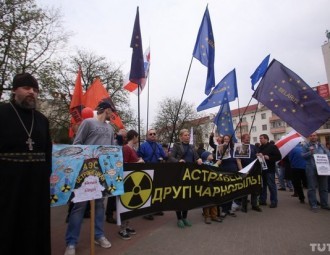Traditional “Chernobyl Way” took place in Minsk

Annual street demonstration “Chernobyl Way” is aimed at attracting the attention of society and authorities to the problems Belarus is facing after the explosion at the Chernobyl NPP.
Traditional “Chernobyl Way” demonstration took place in Minsk on Sunday to mark the 29th anniversary of the Chernobyl nuclear accident.
The sanctioned event, which drew no more than 400 people, began at 2 p.m. near the Kastrychnik movie theater amid heavy police presence, news agency naviny.by informs.
Participants marched in a procession along Surhanava Street, chanting “Zhyve Belarus!” (Long Live Belarus!) and displaying Belarus’ historically national white-red-white flags, banners of opposition organizations and signs saying, “No to Russian Nuclear Threat!” “Chernobyl is Our Pain” and “Freedom to Political Prisoners!”
The march ended with laying flowers and lighting candles at the so-called Chernobyl Chapel in the area of Bangalore Square.
Participants adopted a resolution demanding stopping the construction of a nuclear power plant in Belarus, disclosing all information about the Chernobyl disaster, withdrawing radioactively contaminated areas from economic use, taking all Russian warplanes capable of carrying nuclear weapons from the territory of Belarus, carrying out democratic reform and releasing political prisoners.
The resolution said that Russia’s aggressive and bellicose policy poses a threat of a nuclear war, and that the ongoing nuclear project in Belarus threatens to turn into a new Chernobyl disaster.
The official organizers of the march included Aliaksei Janukevich, chairman of the Belarusian Popular Front; Vital Rymasheuski, co-chairman of the Belarusian Christian Democracy party; Dzmitry Kuchuk, deputy chairman of the Belarusian Party of the Greens; Yury Gubarevich, first deputy chairman of the Movement for Freedom; and Ilia Dabratvor, an activist of an opposition organization called “Razam” (“Together”).
According to human rights defenders, at least three participants were arrested by police following the march. Police also attempted to apprehend opposition activists Leanid Kulakou and Maksim Vinyarski, but they reportedly managed to escape from their pursuers. Mr. Vinyarski was in a white T-shirt with "Lukashenka Go" written on the front.
A government-organized wreath-laying ceremony was held near the Chernobyl Chapel earlier in the day. The ceremony, which featured a military guard of honor, was reportedly attended by more than 2,000 people, including Ihar Buzouski, head of the Presidential Administration; Ihar Karpenka, deputy head of the Minsk City Executive Committee; Andrei Beliakou, first secretary of the Belarusian National Youth Union; members of the House of Representatives and the Minsk City Council, and some foreign diplomats.
-
03.01
-
07.10
-
22.09
-
17.08
-
12.08
-
30.09



























